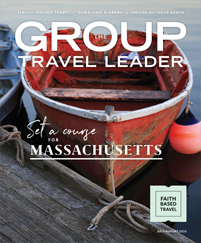Alumni and Educational Travel
Although alumni and educational travel isn’t new, the market may be growing — or at least getting more attention — because the programs offer so much more than typical tours. And unlike some other types of travel groups, alumni travelers have something in common: their alma mater.
“In the States, alumni have affinity to their schools and especially to certain schools,” said Kevin Conley, director of University of Virginia Alumni and Parent Travel. “They immediately have something in common with other people on the trip. They already have something to talk about.”
Several years ago, a task force recommended including more of an educational component in alumni travel, so the University of Virginia (UVA) spun Cavalier Travels out of the alumni association and made it part of the university, Conley said.
The program does 16 to 17 international trips every year, as well as some local reunion-type trips. Every trip includes and involves a faculty member, who gives three to four lectures per trip and spends time interacting with other travelers.
“We’re not just selling travel; we’re involving the alumni with the university,” Conley said. “We’re trying to get UVA faculty in front of UVA alumni.”
Some trends within the market include introducing more volunteer service trips to alumni; offering more exotic destinations, such as the Galapagos Islands; and seeing more intergenerational travel, Conley said. Alumni travelers are bringing their children and grandchildren along, and Cavalier is working to accommodate multigenerational families on more trips. The program is planning three family-oriented trips next year.
If operators aren’t already involved with alumni and educational travel, “they should know it’s very different than FIT,” he said. “We ask a lot; we’re going to do special receptions and lectures and have faculty involved. We’re doing it for engagement reasons.”
Chamber of Commerce Travel
Chamber of commerce travel is one of the most promising group travel markets. The reason is revenue. Many chambers are getting into group travel because it’s a good source of nondues revenue that doesn’t eat up a lot of staff time, said Mary Ann Miller, president and CEO of the Tempe Chamber of Commerce in Arizona.
“I don’t know if any of us are going to get incredibly wealthy or base our budgets on group travel, but it creates a nice cushion,” said Miller, who has been with the Tempe chamber for about 20 years, 15 of those as president. Using tour operators makes it “turnkey,” she added. “For the most part, they make it pretty easy.”
Most travelers on chamber trips aren’t chamber members; they’re community members, Miller said. So it can be difficult to find the “sweet spot” of choosing a place that people want to visit, where they don’t want to go by themselves, that’s at a time that works for them.
The Tempe chamber decided to jump into group travel several years ago with a trip to China, but the organization hasn’t done it consistently because the success of each trip is “hit or miss,” Miller said. Even if the chamber drops travel for a year or two, the organization usually decides to resurrect it.
In 2012, the Tempe chamber offered a trip to Cuba that ended up being so popular that they took 200 travelers there on four trips, Miller said. Other tours, however, attract only five to 10 people, she said; the chamber’s trip to Vietnam last year had six travelers. For 2015, the Tempe chamber is looking at a trip to India and a river cruise down the Danube.
Although Tempe doesn’t, other chambers do more group travel among their own membership, Miller said, usually putting together domestic trips where their members fly to another city to connect with businesspeople there. Miller said Tempe also partners with other chambers to increase exposure and attract more people to their trips.
“[Group travel] is a way to reach out more into the community and get some exposure and raise more revenue,” she said. “We are always faced with higher expenses and how we can pull in more money.”
Marketing to Emerging Groups
Before you can sell to groups, you have to understand why they travel; and then you have to speak directly to them. That’s why Collette recently launched a niche marketing program to target up-and-coming groups with their own custom brochures.
The company just published four new brochures, and each one speaks directly to a specific market: banks, chambers of commerce, faith-based groups, and alumni and education travel.
“Each one of those is really its own unique audience, and speaking to those audiences can be difficult — there’s different verbiage and goals — so we came up with breaking down some of our itineraries into some of these affinities,” said Tony Etienne, vice president of affinity markets for Collette.
Collette reached out to top players in each market, even doing focus groups with some, to get a better understanding of why they travel and what they hope to get from their trips.
“We wanted to hear from them,” Etienne said. “It was coming straight from their mouths.”
Collette took that information, paired it with its top 10 to 15 itineraries in each market and put together brochures that highlight the best-performing trips for that audience. In early August, the company published its four new niche brochures, among them a first-time brochure for the alumni and education market.
“It’s really about pulling these itineraries aside and putting it in a separate brochure that really speaks to them,” he said.
For example, alumni and education groups want historic tours and educational opportunities. Banks are looking for consistency, service and support. Chambers of commerce want to generate nondues revenue. Faith-based groups are all about building relationships and learning about other cultures, Etienne said.
“We realized every one of these audiences travel for different reasons, so we wanted to start breaking up these brochures,” he said. “It’s really them speaking to their peers, instead of us doing a sales pitch as a company.”











